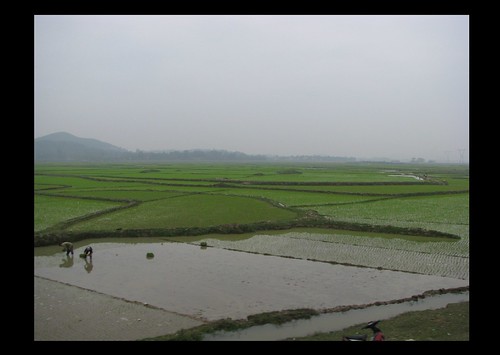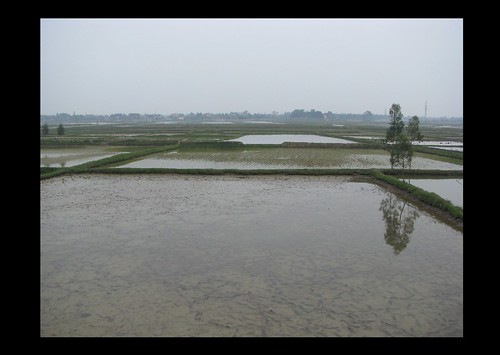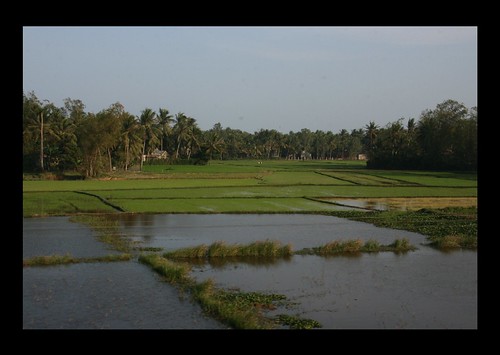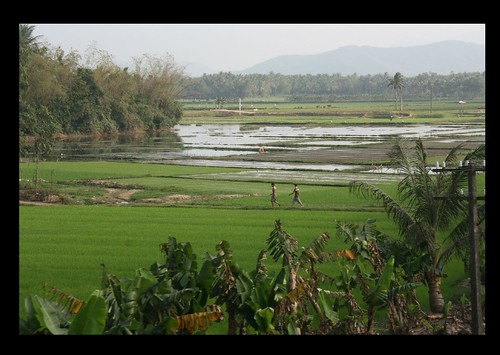P is for….
by Rach
onwards to Hanoi, Vietnam
Prince (and Pauper)
We are the only Westerners on this train. It would seem the majority take the advice we were given to take the more expensive and much faster express train. But as our dollar keeps falling, we’re in pauper mode and opted for the train that makes frequent stops and only manages an average speed of 40km/hr. That’s why it will take two whole days and two whole nights to cover the 1,726 kilometres. The berths on this train are the shortest and narrowest we have encountered, but we are feeling like princes on our four inch thick mattresses. You see, the next compartment has one inch mattresses…..the following has bamboo mats on the wooden planks, and instead of being stacked two high, there are three bunks on top of each other…..the sleepers give way to reclining (in some cases permanently in one position) chairs, which are threadbare and black with grime…..and finally there are very very straight-backed upright wooden seats, not that many people are using them – most have spread their own bamboo mats and plastic raincoats on the floor to sit and sleep on (yes, UNDER the seats).
Makes our compartments look positively palatial.
Performance
If we were paid by all the people, who stop at our door to watch us eat or even to watch us doing nothing, we’d recoup the cost of this journey easily! But we just smile, wave, offer oranges and continue sitting and eating. (And Rob declined the offers to go Vodka-drinking the first night – he was scared he’d never get back to our carriage!)
Power
No-one was allowed on to the platform without a valid ticket. And even then, not until a certain time. Passengers disembarking from a newly-arrived train were not allowed off the platform without re-presenting their tickets. Those who did not were marched away down the platform to who-knows-where? Bureaucracy with a capital B or Communism with a capital C or Power with a capital P?
Then there’s the music man. Yesterday he decided everyone should wake up at 6:30am. Piped music BLASTED through the carriages, rousing even the deepest sleepers. Thou shalt all wake up now and go and queue at the squat toilets, all together now. Thankfully the music did not last all day long – just when Mr Music Man decided we all needed entertainment (from which there was no escape).
But Mr Music had nothing on the new train driver we picked up last night. This guy sat on his airhorn all the way from Danang to Hanoi. I challenge you to look it up on a map and see just how long we listened to the Horn Symphony for – actually, I’ll tell you – about 18 hours of hearing a three-to-five second blast every minute with a ten second blast before leaving a station. Then for the final hour on the approach to the city, the horn played more than it didn’t….honestly, it would blast for about ten seconds and stop for one. Power hungry, we decided, from our too-close vantage point of the second carriage behind the horn.

Ploughing and Planting
A faint five o’clock shadow of newly planted seedlings shimmers across the flooded field. In the next block the earth is hard and dry. Beside it large clumps of dirt are being softened into mud as the water soaks in. The next paddy is also under water and you can still see the cracks in the earth giving it the appearance of a mosaic picture. In yet another, stalks of deepening green sway in the breeze. The harvesting we saw weeks ago is now a distant memory – these people are on to the next round of preparations. Piles of manure are dropped in each paddy, then transferred into baskets to be scattered about by hand before being hoed or hoof-trodden in to the soil. Small patches of intensely-cultivated bright green seedlings are broken up and planted out one by one in the fields; clumps are thrown into the water and lie there, waiting for women to separate them and painstakingly push the roots of each individual plant down into the mud. One by one. Field by field. Acre by acre. The oxen are worked by men trailing behind on wooden boards; ploughing, tilling, breaking up clumps of clay, breaking up clods of earth, sometimes in dry fields, sometimes splashing in water. Some are tethered at the end of a long weighted pole. Some are led along or ridden by young boys. Water is poured from channels into a paddy using a large conical-shaped basket on a stick. In another section someone has rigged up a pump to complete the task more easily. Women walk with baskets hanging from a bamboo pole balanced across their shoulders. Others scatter seeds from a basket on their hips. Bicycles and motorbikes wait on paths to transport their owners home.
There is a season for everything.



P is for Pee (or parenting)
What is it with the littlest kid (who IS toilet-trained) needing to pee in her pants at the very beginning of the two days in confinement? Three times? And what about the one who has never ever wet her bed, losing control on the mattress we were going to sit on for the next 40 hours? Ah well, these things happen.
Paragraph
taken from a letter written to “Dear Mum and Dad” on the train today:
“Having seen some really awesome sights like the bays of blue water or the sunset on the Mekong or rice paddies stretching to the horizon, I wonder how much better heaven will look. Will we even notice what heaven looks like or will our thoughts be centred completely on God?
And if we do see heaven, will we see people like Adam and Eve or Poh-poh? I hope we’ll be able to see Poh-poh! Sometimes I miss her a lot.”
p is for precious
Tags: children, food, God, postcard: Vietnam, toilet, transport




I like the ‘P is for precious’…….a beautiful and thoughtful heart is behind those thoughts. The beautiful photos of all those rice paddies are reminding us of ‘Chu Ju’s House’ which we have just finished reading.
We are just about to head off to the Lake for the long w/e………missing our ‘lake’ buddies. Lots of love from us allx
Hi Rach I had a good laugh reading ” How to be idle” in between catching up on house and garden in January. I recommend Frank Gardner’s book ” Blood and sand” , very human but riveting about the Middle East, he is a BBC journalist who was shot up by terrorists but is working in his wheelchair at the BBC again. It helped me to get over my self pity about my distant European family and grandchild in Italy.
I loved your descriptions of the rice fields, publish a book after your travels and get some expenses back ha ha ha: I be in buying one!!
In 2202 we took the all day bus up North to Hanoi, it only cost $12.00 and was quite comfortable, but of course we had to stay overnight several times in guesthouses.
Be careful in China, there were reports of kidnappings etc…….
Take care, warm wishes and blessings Phi Nati